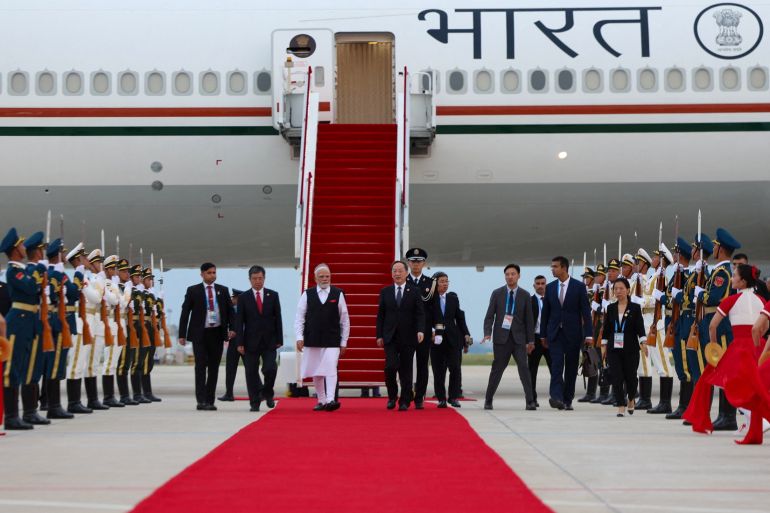India committed to improving ties with China, Modi tells Xi before SCO meet
The Indian leader appears to mark waning of strategic ties with US after Trump slapped punishing tariffs on Indian goods.

Published On 31 Aug 202531 Aug 2025
Indian Prime Minister Narendra Modi has told China’s President Xi Jinping that he is committed to improving bilateral ties, indicating a growing closeness to Beijing only five days after the United States slapped steep tariffs on Indian goods.
“We are committed to progressing our relations based on mutual respect, trust and sensitivities,” Modi told Xi on the sidelines of the Shanghai Cooperation Organisation (SCO) summit that begins in Tianjin on Sunday.
Recommended Stories
list of 4 itemsend of list
Modi is in China for the first time in seven years to attend the two-day SCO summit, along with Russian President Vladimir Putin and other leaders from Asia and the Middle East, in a show of Global South solidarity.
The Indian leader posted a video clip of his encounter with the Chinese president on his X account.
Xi also pledged to resolve border differences with India and bolster cooperation. He said he hoped the Tianjin meeting will “further elevate” and “promote the sustained, healthy and stable development of bilateral relations,” according to state broadcaster CCTV.
The two sides should “not let the border issue define the overall China-India relationship,” Xi said, adding that economic development for both countries should be their main focus.
“As long as they remain committed to the overarching goal of being partners, not rivals, and providing development opportunities, not threats, China-India relations will flourish and move forward steadily,” Xi said.
Advertisement
‘Moving closer to Beijing’
Modi’s statement came after longtime ally, the US, imposed punishing 50 percent tariffs on Indian goods on Wednesday over New Delhi’s purchases of Russian oil, a move that may have accelerated his country’s ongoing thawing of relations with China.
Reporting from Tianjin, where the two-day SCO summit is being held, Al Jazeera’s Katrina Yu said Modi had “made the calculation that he should be moving closer to Beijing”, indicating that the days of the US using India as a counterweight against China were over.
In Sunday’s meeting, Modi said an atmosphere of “peace and stability” had been created on the disputed Himalayan border, where Indian and Chinese troops clashed in 2020.
Modi said India and China had reached an agreement on border management and added that direct flights between the countries, suspended since 2020, were “being resumed”.
Al Jazeera’s Yu said the deadly clashes had marked a “low point” in relations between the nuclear-armed strategic rivals, but that relations had improved in recent months, with officials “talking and meeting consistently about the border” and other issues.
In recent months, China has allowed Indian pilgrims to visit Buddhist sites in Tibet, and both countries have lifted reciprocal tourist visa restrictions.
China had agreed to lift export curbs on rare earths, fertilisers and tunnel boring machines this month during a key visit to India by China’s Foreign Minister Wang Yi.
This month, Chinese Ambassador to India Xu Feihong said his country opposed Washington’s steep tariffs on India and would “firmly stand” with New Delhi.
Powerful bloc
Modi and Putin are among the more than 20 world leaders attending the SCO summit.
China and Russia have sometimes touted the SCO as an alternative to the NATO military alliance. This year’s summit is the first since US President Donald Trump returned to the White House.
“China has long sought to present the SCO as a non-Western-led power bloc that promotes a new type of international relations, which, it claims, is more democratic,” said Dylan Loh, an assistant professor at Singapore’s Nanyang Technological University.
Established in 2001, the SCO comprises China, India, Russia, Pakistan, Iran, Kazakhstan, Kyrgyzstan, Tajikistan, Uzbekistan and Belarus, with 16 more countries affiliated as observers or “dialogue partners”.
Combined, SCO members represent 42 percent of the global population, or more than three billion people, and almost a quarter of the planet’s landmass.
Advertisement
The increasingly powerful bloc accounts for 23 percent of global gross domestic product, worth about $24 trillion a year. And it controls about 20 percent of the world’s oil and almost 44 percent of global gas reserves.
